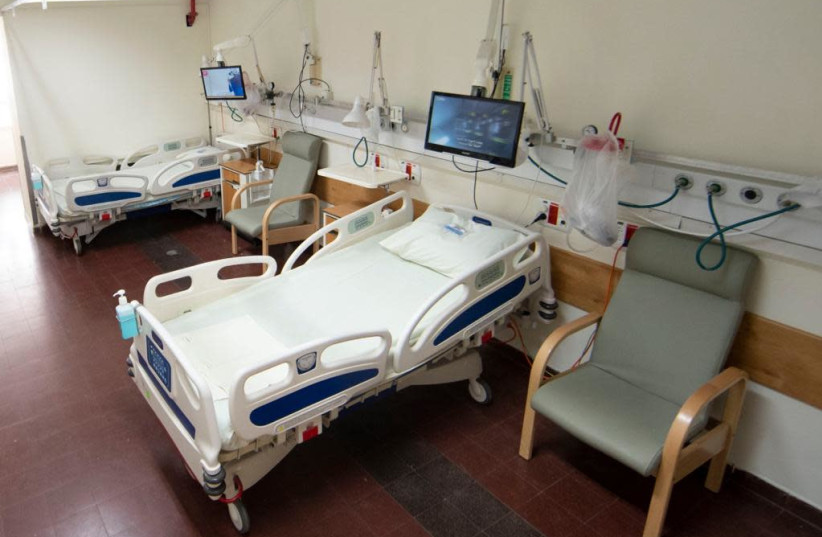In Israel, hospitals were asked by the Health Ministry to halt elective procedures and some outpatient clinic work to make beds available for a flood of coronavirus patients that never came.
An empty hospital bed at Hasharon Hospital
(photo credit: Courtesy)
Prevention and treatment services for noncommunicable diseases have been severely disrupted by the novel coronavirus pandemic, according to a survey released this week by the World Health Organization, and the result could be sicker people or even death.
“The results of this survey confirm what we have been hearing from countries for a number of weeks now,” said Dr. Tedros Adhanom Ghebreyesus, director-general of the World Health Organization. “Many people who need treatment for diseases like cancer, cardiovascular disease and diabetes have not been receiving the health services and medicines they need since the COVID-19 pandemic began.”
The survey was completed by 155 countries during a three-week period in May and came on the heels of a letter sent last month by some 600 US physicians to US President Donald Trump, in which they called the coronavirus lockdown “a mass casualty event” that could cost the lives of million of non-coronavirus patients.
“The downstream health effects… are being massively under-estimated and under-reported,” the letter read.
There are three reasons that during the height of the COVID-19 pandemic patients did not receive proper care in Israel and other countries around the world, said Dr. Arnon Afek, deputy director-general of Sheba Medical Center. They are: hospitals could not deliver care because staff was reassigned to coronavirus units or they could not set up their units to keep non-corona patients safe; a reduction in primary care visits and screenings; and fear.
In Israel, hospitals were asked by the Health Ministry to halt elective procedures and some outpatient clinic work to make beds available for an expected flood of coronavirus patients that never came.
Outgoing Health Ministry director-general Moshe Bar Siman Tov predicted at least 5,000 patients would be intubated. But the beds stayed empty, causing harm to patients and financial distress to hospitals that are paid for services.
At Sheba, Afek said that they separated into two hospitals – one for taking care of coronavirus patients and the other for “regular” patients. Other hospitals did the same, such as Rambam Health Care Campus in Haifa and the Rabin Medical Center-Hasharon in Petah Tikva. But some hospitals didn’t have the space or staff.
This was especially true in countries like Italy and Spain, or in New York in the United States, where huge numbers of COVID-19 patients arrived at the hospital at the same time, forcing doctors to turn away any patients who were not in need of emergency care.
IN ISRAEL, outpatient and community clinics run by the health funds also reduced their work. Some of them used telemedicine, for example, but Afek said they could not respond to the needs of every patient. Older patients, especially, were not used to online appointments and might simply have not made appointments.
“They could not respond to every patient,” he said, “especially when they had to diagnose severe cases or new diseases. So, we got less referrals.”
Finally, he said that patients were afraid if they came to the hospital, they would catch coronavirus, a phenomenon referred to as “COVID-phobia.”
“We had a woman call and ask what to do: she suffered from chest pains all night but did not want to come from the hospital,” Afek recalled. “And this was a patient who is known to have systemic heart disease.”
Prof. Zeev Rotstein, director of Hadassah-University Medical Center, said that he learned of a 67-year-old man who “felt uncomfortable in his chest. He was afraid of coronavirus, so he decided to stay home. He collapsed and died.”
Rotstein said Hadassah had to put 250 staff members on furlough because there was no work for them to do, while all focus was on coronavirus.
The letter by the US physicians cited untreated heart attacks and strokes, too, as well as broken bones and lacerations.
Afek said that Sheba saw a 50% to 60% decrease in a number, if not all, of non-urgent operations or treatments during the peak of the pandemic.
A survey of nine major US hospitals that was published by the Journal of the American College of Cardiology showed the number of severe heart attacks being treated in US hospitals had dropped by nearly 40% since the novel coronavirus took hold in March.
WHO showed that 53% of the countries surveyed had partially or completely disrupted services for hypertension treatment; 49% for treatment for diabetes and diabetes-related complications; 42% for cancer treatment and 31% for cardiovascular emergencies.
Rehabilitation services had been disrupted in almost two-thirds (63%) of countries.
Furthermore, according to WHO, the postponement of public screening programs (for example for breast and cervical cancer) was also widespread, reported by more than 50% of countries.
The results?
“When diagnoses are not made, treatments start later and people present with more severe diseases,” Afek told the Post. “The result is that patients will be sicker when they come in for care and more deaths.”
Already, he said, the country is seeing overflowing hospitals with patients coming for treatments that were delayed for COVID-19.
Dr. Bente Mikkelsen, director of the Department of Noncommunicable Diseases at WHO, said, “It will be some time before we know the full extent of the impact of disruptions to healthcare during COVID-19.”
%


